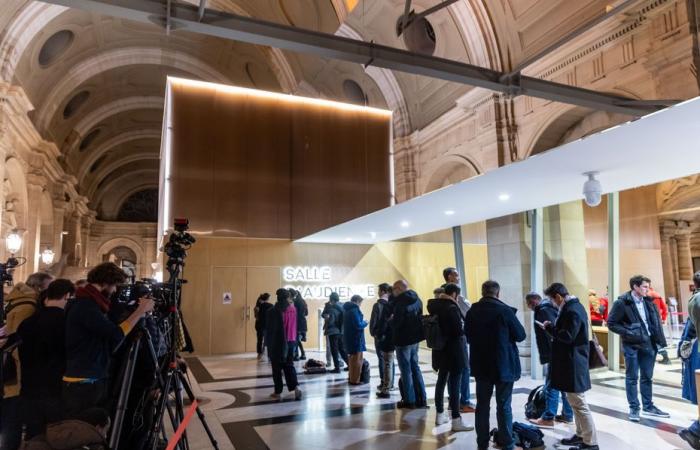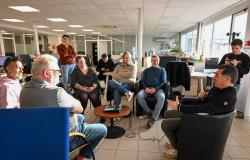Lawyer in Rennes, Vincent Berthault represented the principal of the Bois-d'Aulne college in Conflans-Sainte-Honorine where Samuel Paty worked. He looks back on the seven trying weeks of the trial for the professor's assassination and on his verdict which he and his client judge to be “up to par” with what teaching represents.
Company
From daily life to major issues, discover the subjects that make up local society, such as justice, education, health and family.
France Télévisions uses your email address to send you the “Society” newsletter. You can unsubscribe at any time via the link at the bottom of this newsletter. Our privacy policy
The eight accused in the trial for the assassination of Samuel Paty were sentenced on December 20, 2024 by the special assize court to sentences ranging from one year in prison to 16 years of criminal imprisonment. Lawyer in a Rennes firm, Me Vincent Berthault represented Ms. F., the principal of the college where the murdered professor taught history and geography.
Present daily at the hearing in Paris from November 4 to December 20, the Rennais reflects on the verdict pronounced against the eight accused and on this extraordinary trial, his first experience in terrorist matters.
This verdict is not final and the accused have until December 28 to appeal. The three defendants against whom the longest sentences were handed down (Naïm Boudaoud, Azim Esirkhanov and Abdelhakim Sefrioui) announced that they would appeal.
Are you satisfied with the verdict handed down against the eight accused? ?
Vincent Berthault : It is a very precisely reasoned decision, pronounced by ultra-specialized magistrates who recognize the guilt of all the accused. The verdict is up to what teaching and its transmission of knowledge represent, as well as the issues of secularism. It also makes the use of social networks more responsible.
Because the court, it seems to me, adapted its verdict to today's digital tools : the agreement between the accused and the assassin is virtual, but [le terroriste] Anzorov was not. (…) The magistrates proved that nothing was due to chance by recognizing the guilt of all the actors in this disorder, this causal chain.
What moments stood out to you during this trial?
During the trial, I felt that all the accused seemed to wash their hands of it. Apart from Ismail Gamaev, everyone wondered why they were there [seul accusé à plaider coupable, Ismail Gamaev a raconté à la cour sa radicalisation religieuse express en 2020 puis son long parcours de déradicalisation, NDLR].
Gamaev is a kid, but he had courage. When the verdict was announced, I told him that he was not without it. Convicting someone also means keeping them in society, and the court indicated to them that their direction was the right one. He bluffed me, he touched me.
At the Paris Special Assize Court, the 8 major defendants in the trial for the terrorist assassination of Professor Samuel Paty
•
© Elisabeth de Pourquery/ France Télévisions
The other accused did not recognize their responsibility, or even indulged in victimization. (…) The testimonies of those close to Abdelhakim Sefrioui struck me, because in my opinion, they demonstrated a persistent blindness. They tried hard to make it politically correct.
From his ideals to the announcement of the verdict where he denounced a “political trial”, Abdelhakim Sefrioui maintained his victimization. My client nevertheless describes it during their interview [A. Sefrioui avait été reçu par la principale peu avant l’assassinat pour se faire expliquer la controverse autour du cours de Samuel Paty] as someone who was in demand and one-upmanship.
What does your client think of this verdict? ?
My client says she is relieved, for her as well as for Samuel Paty's family. She wants to be available for them. She was present throughout the second week of the trial [elle n’est plus à la tête du collège du Bois-d’Aulne mais exerce aujourd’hui à l’étranger, NDLR].
She wanted everyone's guilt to be recognized, to reinfuse respect into teaching. It seemed essential to him that we affirm that we do not touch teachers.
The week before the assassination, she provided support, whether legal or psychological. During this trial, the middle school teachers told me that their luck in this drama was to have had a principal like her. She is a quite extraordinary person, who is steeped in teaching, who is at the service of children.
Rennais Vincent Berthault defended the interests of the principal of Samuel Paty's college, a civil party to the trial.
•
© Valentin Pasquier / France Télévisions
How did you get involved in this terrorist file, the first of your career? ?
I have been representing Ms. F. since September 2023, barely a month before the hearing before the children's court [les accusés mineurs de ce dossier ont fait l’objet d’un procès disjoint, en décembre 2023, NDLR]. I took over urgently from a colleague, and had to read the file very quickly. To devote myself fully to it, I adopted an almost monastic lifestyle, pretending to certain relatives that I had taken a vacation. !
As the trial came before the children's court, the principal took action against the children in her care who denounced their teacher to the murderer. She was paralyzed.
You were one of the few non-Parisian lawyers in this trial. How did you approach it?
It is an extraordinary trial, due to its theme of terrorism and its seven-week format. For a month and a half, we focused on this file. It's a long break away from our bases, which makes you feel a little dizzy. I came back to Rennes every other weekend, my family regularly came to see me. Everyone must rise to the challenge. Fortunately it’s not our daily life [rires].
At the office, everyone responded. We had to support what was happening at the special assize court in Paris, but also maintain daily activity in Rennes. I did a little daily update with my client, but also at my office. Everyone redoubled their efforts. Without them, I do nothing.






